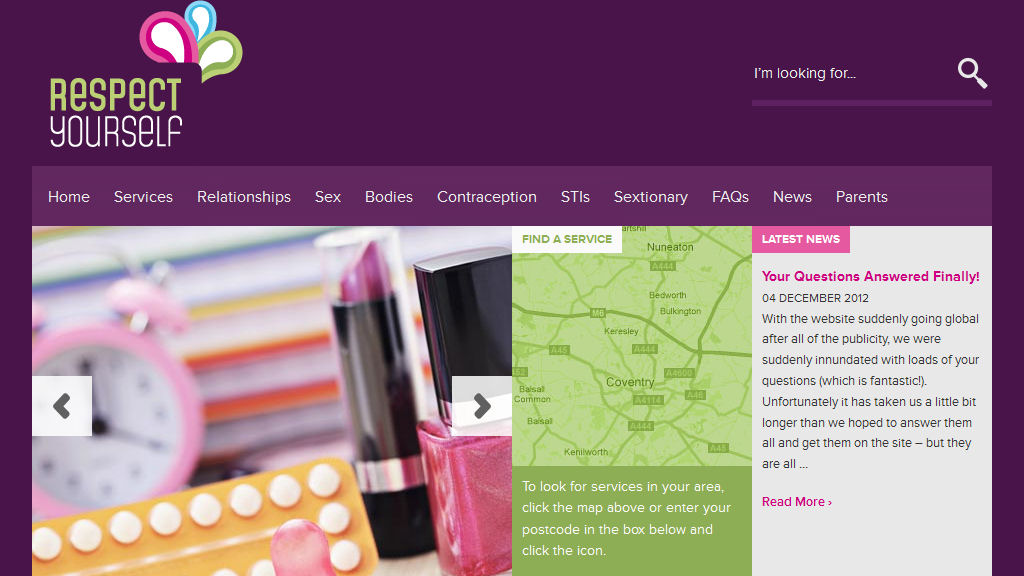Let’s talk about sex: website answers teens’ questions
From a “sextionary” to myths about contraception, one NHS and council-led website is confronting the sexualisation of teenagers head-on, as Channel 4 News’s Generation sex series hears.

For children aged between 13-16 years, sex is part of everyday life. From sending and receiving naked pictures to watching hardcore pornography, teenagers Channel 4 News spoke to across the country as part of our Generation sex investigation said that adults need to get used to the fact that the world has changed.
One 15-year-old boy told us: “It might shock parents that this is what kids get up to but to them it’s just everyday life, it’s natural, all part of growing up.”
However, all of the teenagers we spoke to said they wished that there was some kind of guidance from adults to help them navigate this brave new world.
The kids say the time for society throwing up its hands in horror at what young people are exposed to is over. So should adults enter the sometimes murky world of teen sex in the digital age to make sure the right messages are getting across? One pioneering project in Warwickshire believes they should.
Respect Yourself
The “Respect Yourself” site and app was set up by NHS Warwickshire, Warwickshire County Council and Coventry Council earlier this year.
It aims to bring sex education up to date, giving teenagers the sort of information they really want as well as helping them access services with a “service finder” section. To do this, the team worked with young people in an 18-month project.
The internet has changed how young people find out about sex. Amy Danahay, Respect Yourself project manager
The council’s project manager for the site, Amy Danahay, told Channel 4 News: “The internet has changed how young people find out about sex. A recent YouGov survey revealed that the average young person has already accessed some form of porn by the age of 10 and 58 per cent of teens are regularly accessing it.
“In Warwickshire, to address this, we have introduced a website and app to talk to them in their language and provide information in a medium that we know they use and which is monitored by professionals. Throughout the development of this project we have involved young people to help us find the best way to clearly communicate public health messages.”
She said the website completed the “wish list” of young people, who wanted a “sextionary” and other features. It also includes a section for parents.
Read more on Generation sex: the new rules of the playground
Controversy over content
However, the website has not been without its critics. Its frank approach to sex – which includes an area where users can click on pictures of a man and woman to find their “pleasurezones” as well as a FAQs section with questions about relationships, sexual slang and virginity, all sent in by teens – has shocked some. The site also includes more explicit content about masturbation, pornography and prostitution.
It tells teenagers that, while the age of consent is 16, every individual is the only person who knows when they are ready to have sex.
Ms Danahay said the website “has been based on thorough research into what young people need, how they want to access the information and how it should be presented”.
She said it is based on research on how this kind of information is presented in the Netherlands, where the rate of teenage pregnancy is over five times lower than it is in England and where contraception is much more widely used.
“Clearly their approach has worked and we would be wrong if we neglected to take lessons from that. We have every reason to expect that it will have excellent results in tackling the issues this investigation has raised,” she said.
-
Latest news
-
Taylor Swift’s new break-up album breaks records3m

-
NHS trust fined £200K for failings that led to death of two mental health patients3m

-
Sunak vows to end UK ‘sick note culture’ with benefit reform3m

-
‘Loose talk about using nuclear weapons is irresponsible and unacceptable’, says head of UN’s nuclear watchdog3m

-
‘There wasn’t an Israeli attack on Iran,’ says former adviser to Iran’s nuclear negotiations team7m

-




